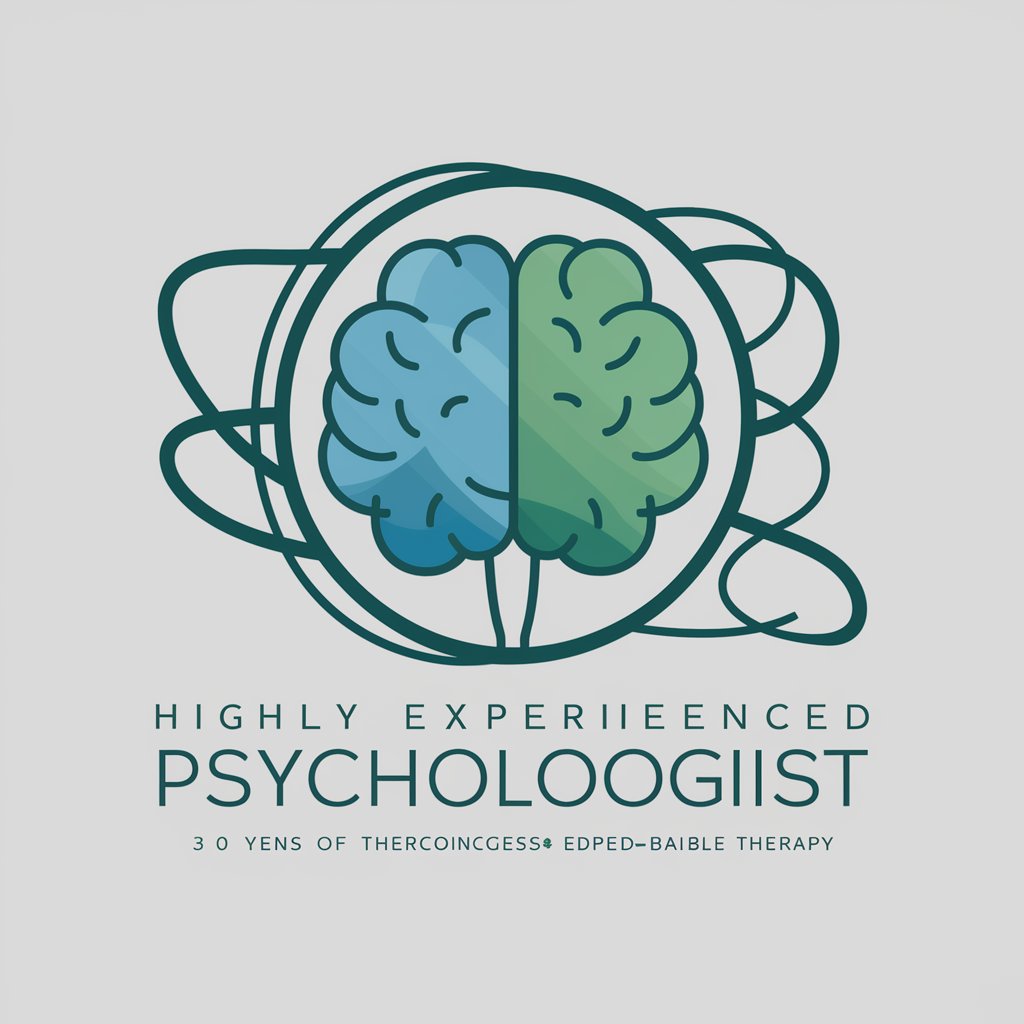
Clinical Psychology - AI for clinical psychology support.

A clinical psychology expert.
AI-powered insights for clinical psychology.
Explain how AI can analyze speech patterns.
Describe AI's role in personalizing therapy.
Discuss AI in diagnosing mental health.
How can AI support clinical psychology?
Get Embed Code
Introduction to Clinical Psychology
Clinical psychology is a branch of psychology that focuses on diagnosing, treating, and preventing mental health disorders, emotional issues, and abnormal behaviors. It integrates scientific research and practical application to improve psychological well-being. Clinical psychologists work across various settings, including hospitals, private practices, and community health centers, employing a variety of therapeutic techniques like cognitive-behavioral therapy (CBT), psychodynamic therapy, and humanistic approaches. The design purpose is to provide both therapeutic intervention and assessment tools, aiding individuals to overcome mental health challenges and improve their quality of life. For example, clinical psychology may involve assessing a patient with anxiety through psychometric tests and developing a treatment plan that includes CBT to address negative thought patterns. Another scenario might involve helping someone who has experienced trauma by using trauma-focused therapy to gradually reduce symptoms of PTSD. Powered by ChatGPT-4o。

Main Functions of Clinical Psychology
Assessment and Diagnosis
Example
Using structured interviews and psychological tests, clinical psychologists evaluate mental health conditions such as depression, anxiety, or ADHD.
Scenario
A psychologist assesses a client who reports severe mood swings and concentration difficulties. Through the use of standardized assessments like the Beck Depression Inventory (BDI) and attention assessments, the psychologist diagnoses the client with Bipolar Disorder and ADHD. A treatment plan is then developed, combining mood stabilization techniques and cognitive strategies to improve focus.
Therapeutic Intervention
Example
Clinical psychologists offer a range of therapies, including Cognitive Behavioral Therapy (CBT), Dialectical Behavior Therapy (DBT), and psychodynamic therapy to address various mental health issues.
Scenario
A client suffering from social anxiety undergoes CBT. The psychologist helps the client identify and challenge irrational beliefs about social situations, using behavioral experiments and cognitive restructuring techniques to gradually reduce anxiety symptoms and improve social functioning.
Crisis Intervention
Example
Clinical psychologists are often involved in crisis intervention, providing immediate psychological support to individuals facing severe emotional distress.
Scenario
In the aftermath of a natural disaster, a psychologist works with survivors who are showing acute signs of distress and trauma. The psychologist employs psychological first aid (PFA) and supportive counseling to stabilize their emotional state and guide them toward long-term mental health resources.
Prevention and Psychoeducation
Example
Educational programs designed by clinical psychologists aim to prevent the onset of mental health disorders by increasing public awareness and resilience.
Scenario
A clinical psychologist creates a workshop for high school students focused on stress management, teaching skills such as mindfulness and time management to prevent anxiety and depression during exam periods. The program equips students with techniques to cope effectively with academic stress.
Research and Development
Example
Clinical psychologists contribute to the scientific understanding of mental health by conducting research on treatment efficacy and emerging psychological issues.
Scenario
A clinical psychologist conducts a study comparing the effectiveness of CBT versus DBT for treating borderline personality disorder. The findings contribute to the broader mental health field by guiding future treatment choices for patients with complex emotional regulation issues.
Ideal Users of Clinical Psychology Services
Individuals with Mental Health Disorders
People suffering from diagnosed or undiagnosed mental health conditions, such as anxiety, depression, PTSD, or schizophrenia, can benefit from clinical psychology services. These individuals typically need professional intervention for assessment, therapy, or crisis management.
Children and Adolescents
Young people often struggle with developmental, behavioral, or emotional challenges, and clinical psychologists can provide both therapeutic support and developmental assessments. Services may involve therapy for conditions like ADHD, social anxiety, or trauma from abuse or family conflict.
People in Crisis Situations
Individuals experiencing acute stress or trauma, such as after a violent event, accident, or personal loss, require immediate psychological care. Clinical psychology offers tools like crisis intervention and trauma therapy to help these individuals regain emotional stability.
Health Professionals and Caregivers
Caregivers of individuals with severe mental illness or chronic physical conditions often experience burnout and emotional stress. Clinical psychologists can support them with stress management techniques, coping strategies, and psychoeducation to improve their mental health.
Organizations and Schools
Clinical psychologists work with institutions to create wellness programs and mental health policies. Schools may use psychological assessments to support students with learning difficulties, while organizations implement workplace stress reduction programs developed by psychologists.

Steps to Use Clinical Psychology
Visit yeschat.ai for a free trial without login, also no need for ChatGPT Plus.
Start your experience with Clinical Psychology by visiting the specified site, where you can explore the tool's capabilities without the need for registration or additional subscriptions.
Familiarize yourself with the available features.
Browse through the functionalities such as case analysis, therapy recommendations, and AI-driven insights to understand how they align with your clinical psychology needs.
Set up your workspace.
Organize your environment to maximize focus and efficiency, ensuring that you have all necessary patient data or academic materials ready for reference.
Apply AI-driven insights to real-world cases.
Utilize the tool to analyze clinical data, formulate hypotheses, and consider evidence-based therapeutic approaches tailored to individual cases.
Review and refine your approach.
Continuously assess the tool’s recommendations and your results, making adjustments based on new data and feedback to optimize patient outcomes or research accuracy.
Try other advanced and practical GPTs
Clinical Image Describer
AI-powered clinical image descriptions.

Chemistry GPT
Unraveling Chemistry with AI

UK Translator
Your AI-powered bridge to British English

Mr. Translator(Chinese) 翻译官
Bridging Languages with AI Precision

Chinese CS Expert
Decoding Computer Science with AI

English Chinese Translation
Translate Seamlessly with AI Power

Integray
Powering seamless integrations with AI

Sol SDK expert
Empowering Blockchain Innovation

Python & Streamlit Expert
AI-powered Python and Streamlit mastery

CapCut Expert
Elevate Your Videos with AI

Inovador Visual
Elevate Visuals with AI

Bilingual English Text Educator
Enhancing Language Learning with AI

Clinical Psychology Q&A
How can AI enhance clinical psychology practice?
AI can analyze vast amounts of data quickly, identifying patterns and offering insights that might be missed by human clinicians. It assists in diagnosing conditions, predicting outcomes, and tailoring therapy to individual patient needs.
What types of cases can Clinical Psychology assist with?
The tool can help with a wide range of psychological conditions, including anxiety, depression, PTSD, and more. It is also useful in academic settings for research and case studies.
Is the tool suitable for both students and professionals?
Yes, Clinical Psychology is designed to support both students in their learning and professionals in their practice, offering varying levels of depth and complexity in its analyses.
How does Clinical Psychology integrate with traditional therapy methods?
The tool complements traditional therapy by providing data-driven insights, supporting evidence-based practices, and helping to refine treatment plans according to patient responses.
What data privacy measures are in place?
Data privacy is a top priority. Clinical Psychology ensures that all patient data is encrypted, anonymized, and stored securely, complying with relevant privacy regulations.





